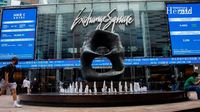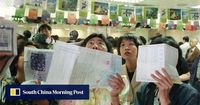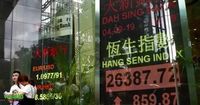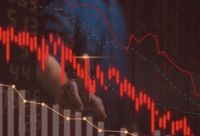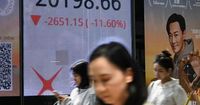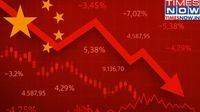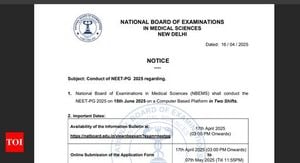On April 7, 2025, Hong Kong's financial landscape witnessed a catastrophic event as the Hang Seng Index plummeted by 13.22 percent, marking its steepest single-day decline in nearly three decades. This dramatic drop, which reached as much as 13.74 percent during the day, drew parallels to the 1997 Asian financial crisis when the index fell by 13.7 percent in a single trading session. The turmoil was primarily triggered by escalating tensions between the United States and China, following President Donald Trump’s recent tariff announcements that have sent shockwaves through global markets.
The latest tariffs, which include a baseline duty of 10 percent on imports imposed by U.S. customs authorities on April 6, 2025, alongside steeper duties ranging from 11 percent to 50 percent scheduled to take effect on April 9, have sparked fears of an impending recession. This sentiment was echoed by Carlos Casanova, a senior economist at UBP in Hong Kong, who stated, “Friday was a public holiday in Hong Kong, so what we are seeing is the reaction to Trump’s tariffs and China’s retaliation. So it’s a double whammy.”
China retaliated swiftly, announcing a 34 percent tariff on U.S. imports, a move described by Beijing’s Vice Commerce Minister Ling Ji as necessary to steer the United States back towards the multilateral trade system. “The root cause of the tariff issue lies in the United States,” Ling remarked, highlighting the escalating trade war between the two largest economies.
The fallout from these trade tensions was not confined to Hong Kong. The Nikkei 225 index in Japan also suffered a staggering 7.8 percent decline, while other Asian markets, including those in South Korea, Taiwan, and Singapore, faced steep losses. The global impact was profound, with stock markets shedding trillions of dollars in value since Trump’s initial tariff announcement. U.S. stocks alone have lost over $6 trillion since what has been termed Trump’s “Liberation Day” announcement.
In the wake of these developments, experts have advised caution among investors. The Mirae Asset Hang Seng TECH ETF FoF, which tracks the Hang Seng index, reported a drop of nearly 12.75 percent on the same day. While the fund had recently seen a correction of 10–12 percent, analysts cautioned against making aggressive allocations. “The fund remains prone to sharp ups and downs due to volatility and geopolitical risks,” an expert noted. “History shows that quick rebounds after deep falls don’t always hold up over time.”
In addition to the Hang Seng Index, two China-based funds, Axis Greater China Equity FoF and Edelweiss Gr China Equity Off-Shore Fund, reported losses of around 5 percent each over the past week. The international funds, in general, have faced a grim outlook, with many dropping by up to 13 percent in the same timeframe. Out of 65 international funds tracked, approximately 61 have posted negative returns, a stark contrast to the few that have managed to deliver positive results.
As the global market grapples with the fallout from these tariffs, experts suggest that a balanced allocation between U.S. and international funds could be a prudent strategy. “Funds that are diversified across regions and sectors, or are actively managed with tactical flexibility, may be better positioned,” advised an analyst. “Overall, a balanced allocation between U.S. and international funds, with an emphasis on regions less vulnerable to U.S. trade policy, could be a prudent strategy until the global trade landscape becomes clearer.”
The repercussions of these tariffs extend beyond stock market fluctuations. Oil prices have also been affected, with U.S. oil dropping below $60 a barrel for the first time since April 2021, raising concerns about a potential global recession. Stephen Innes at SPI Asset Management described the situation as “blunt-force economic warfare,” indicating that the market is signaling a sharp decline in global demand.
As the situation develops, it remains clear that the ramifications of Trump’s tariffs are far-reaching, impacting economies and investors worldwide. The Hang Seng Index's plunge into bear territory, having lost over 20 percent from its recent peak, exemplifies the current market volatility and uncertainty.
In the midst of these challenges, some market analysts remain cautiously optimistic, suggesting that the market may soon find a bottom and rebound as it has done in the past. Lawmaker Robert Lee Wai-wang noted that “there was pent-up selling pressure after a public holiday on Friday in Hong Kong and mainland China,” which contributed to the severity of the drop.
As the world watches closely, the interplay between U.S. tariffs and China's retaliatory measures will undoubtedly continue to shape the financial landscape, leaving investors to navigate through these turbulent waters with care.
